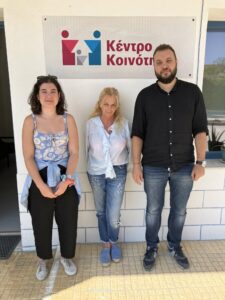The Observatory of Social Inclusion visited the Municipality of Milos from August 29 to August 30, 2024, in the context of the field surveys currently conducted on islands of the South Aegean Region. During this period, the following were carried out:

A meeting in the Municipality of Milos with the Mayor, Mr. Manolis Mikelis.
An interview with the Head of the Social Service of the Municipality of Milos, Ms. Athina Tzika, Social Worker.
An interview with the Psychologist of the Community Center of Milos, Mr. Nikos Koutouratzis.
During the interviews it emerged that there are still no extreme phenomena of poverty, homelessness or delinquency. The profiles of people participating in social services remain stable, mainly including people who need ongoing support. However, domestic violence has been reported to have intensified since the coronavirus pandemic, despite support efforts being made.
Moreover, it was mentioned that uncertainty significantly complicates the daily life of the residents. Access to housing for young teachers or doctors is also difficult.
It is important that harmonious cooperation and mutual support have been achieved between social services locally, with the aim of supporting vulnerable groups. Meanwhile, the extension of the Community Center’s actions to the other islands it serves, such as Serifos, Sifnos and Kimolos, has been strengthened.
As far as accessibility is concerned, even though interventions have been made in public buildings, there are still issues concerning everyday life, especially in matters of respect and adaptation of the local community towards people with disabilities and mobility difficulties.
Regarding the elderly, the need for care was highlighted, especially for elderly people living alone. The daily effort of the executives is focused on improving benefits, while the voluntary operation of the Open Care Center for the Elderly contributes to additional actions and to the relief of caregivers. Problems related to insularity, such as access to services, remain serious, but efforts are being made to further strengthen services through financing tools.
Overall, the need for collaboration with the state to fully understand local needs was highlighted. In addition, interventions in the education system and local groups are seen as critical for shaping future solutions. The priority of the Municipality is to meet the needs of the permanent residents, while significant efforts are being made to develop a sustainable tourist model, which will not be at their expense. The maintenance and protection of the island’s infrastructure is also a priority.
The Observatory also conducted interviews with four beneficiaries of the Guaranteed Minimum Income. The profiles of these people vary, including elderly people unable to care for themselves, young people trying to work on the island, as well as people with health problems.
The interviewees pointed out that the increase in income from tourism does not necessarily mean that their access to equal opportunities for employment and social inclusion is ensured. Despite the economic benefits that tourism brings to the island, vulnerable groups, such as the beneficiaries of the Guaranteed Minimum Income, often face obstacles in finding work and participating in the local community. Inequalities in access to resources make their social inclusion difficult, despite overall economic growth.

In conclusion, the Observatory would like to thank all the participants from the Municipality of Milos for their contribution to the research as well as Ms. Michaelia Fotinou, administrative officer of the Community Center, for her support in communicating with the beneficiaries.
The detailed results of the research will be published on the Portal of the Observatory of Social Inclusion of the South Aegean in October 2024.
(Text and photos: Georgia Tseva)

